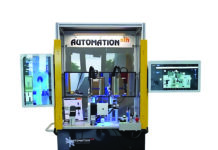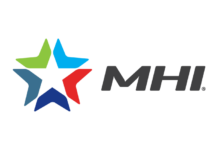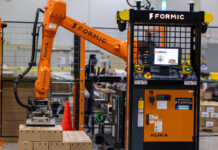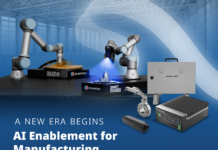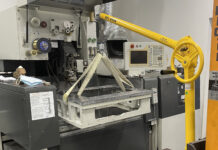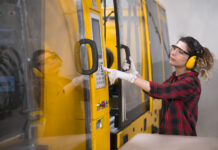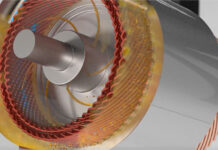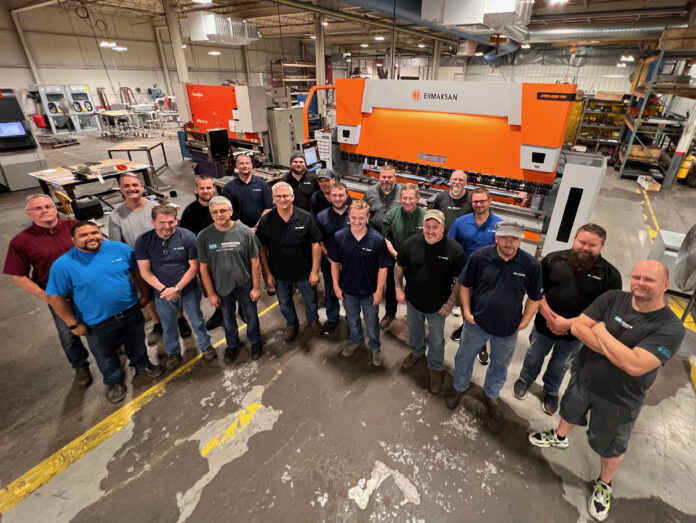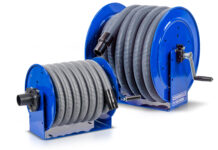Could you please give me some background information on Edgewater Automation, including its history and inception, as well as what led it to offer the new fabrication, manufacturing, and machine shop?
In 2001, Edgewater Automation started with a handful of employees in a 5,000 square foot rented facility in St Joseph MI. The company finished 2001 by moving into brand new plant. Over the years, this plant has grown to over 48,000 ft in our St. Joseph, MI, location. In 2013, Edgewater opened its new 40,000 sq ft Spartanburg, SC, facility. The Spartanburg plant and the St Joseph plant are sister plants with complete design, build, integration, test, and installation capabilities. We started our plant in Spartanburg to better serve our customers in the southeastern part of the US. In 2014, we opened a 35,000 sq ft manufacturing plant in Buchanan, MI. We opened this plant to allow us more flexibility in building our customer automated machines and to create faster turnaround times for the fabrications and machined parts needed. We also found others wanted this capability and we have be able to expand what Edgewater offers to more companies in various industries. We use lasers, CNC benders, and CNC machining cells to better meet our growing needs. We have a new Haas Gantry mill. In 2020, we launched both our Buchanan Automation group and our large system build space in Buchanan, adding an additional 160,000 sq feet. Across all the plants we have design engineering, manufacturing, and assembly staff led by experienced project managers and technical leads. Currently, we have 235 people across all sites.
Tell me more about the machine shop itself and the staff/operators who work there.
We have CNC machine shops in all of our plants to allow us to make the parts we need when we need them. We want complete vertical capability whenever possible, even if we don’t have all the capacity we might need. Our plan is to be able to make our parts to keep our customers’ project moving at all times. We have grown our fabrication business understanding that we need to include other customers outside the automation customers we have to better equip our capability.
Please give me an overview of the automation-minded products and services Edgewater offers.
Edgewater focuses on custom assembly and test equipment, robotic integration, material handling systems, process equipment for multiple industries as well as ovens and dispensing automation. By having our own design, manufacturing, assembly, software development, and installation services all in our capability we can move quickly and effectively for our customers. We invest not only in equipment but the people and skills it takes to make one of a kind automation work right, right away.
Our customers need solutions that cannot be found in the marketplace. These solutions need to be invented or customized to a point to meet their specific needs.
How have you seen modern automation-focused manufacturing practices like 3D printing reshape traditional manufacturing for small-, medium, and large-scale manufacturers?
We use 3D printing every day in a myriad of ways. We use it to prove our tooling, make sample parts to help us develop processes, and, in some cases, to 3D-print parts for our machines when other methods are either impossible or too costly.
Please walk me through Edgewater Automation’s “core competencies.” How do these set it apart from other service providers and machine shops in the industry?
The core competencies start with our applications team, which helps create the specifications and proposals to meet the custom demands of our customers.
Our machine designers take these concepts and turn them into the print packages that will allow us to build a custom machine designed for our customers specific and special needs.
Our build team knows what it takes to bring a one-of-a-kind piece of equipment to life, providing long term solutions that have been producing our customer’s products for the past two decades. Our controls engineers program the robots and PLC’s to make sure the system is running reliably. We do a complete FAT on our floor with our customer’s parts to ensure the machine meets all their needs prior to ever shipping. Our Controls team works on making sure the interfaces to the customer’s factory floor system and their production teams are set for success.
Industry 4.0 is quickly becoming more and more commonplace in manufacturing environments around the world, particularly here in the U.S. However, smaller machine shops sometimes struggle to keep up. What advice would you offer a smaller manufacturing operation that is considering adopting automation but may be uneasy to move away from the way things have always been done?
Doing nothing is the wrong answer; start by doing something. Tie one piece of your process to a report or downstream process that you know you can be successful with. Then grow from there. We are supplying more and more robots that can tie into other processes for smaller companies than ever before as people are so hard to find.
Industry 4.0 is everywhere and as data becomes easier to connect we seem to want more and more of it. Integrating these data points to your automated process and helps uptime, increases safety, and helps continually improving the process. As robots learn they can also become more effective. Automation will continue to expand and grow, Industry 4.0 will help us do this safely and increase our ability to learn
Where do you see the world of manufacturing, metalworking, and machine shops headed in the next 10 years? (More specifically, in regards to IIoT and automation. i.e., 3D printing, lights-out manufacturing, dark factories, robotic automation, etc.)
We are focused on the automation side of the business, and we are seeing more and more people driven to automation. As the supply chain is challenged, automation is becoming more flexible and people are so hard to find. We foresee that in the next 10 years our customers will want to build their products closer to their customers. In the U.S., this will mean more automation, and more robots.
Are there any new products or services you’d like to highlight?
A service we’re getting really good at is that we are always creating new ways of applying innovative engineering to our customers’ projects so that they can do things they never thought they’d be able to, or that help them solve problems they have. Internally, we share the problems and solutions our teams came up with with the rest of the team so that everyone can learn a better way of doing things from one another. A new product we’re proud of is the mobile robot we recently designed and built for one of our customers that saves their workers a lot of heavy physical labor.
How was the company and its clients affected by the COVID-19 pandemic, and what does business look like now that we’re getting back to normal life?
We had to learn to work differently and work around supply chain stoppages. We had to be more flexible and more creative.
One way we worked differently was the remote work we had to learn to do. Designing custom equipment is never easy, but when you can’t meet face to face it was made harder. We learned how to work on designs in steps that could be communicated via web-based meetings, even web based FAT. When our customers could not travel to do the factory acceptance test, we took that test to them. We set up cameras and headsets and performed the FAT virtually. Not as good as the real thing, but close.
We were proud to have made PPE on short notice to help local responders in southwest Michigan.
As for supply chain, we had to get creative, in some cases changing our designs to solve problems with the parts we could find.
What’s on the horizon for Edgewater Automation?
We are looking at growth. Our growth in health care has been our fastest growing segment and we see that continuing for many years. Energy is another sector we see as a good opportunity for automation. There is opportunity in the market for expanding automation into new fields and helping our current customers grow.
Is there anything else you’d like to include that I haven’t asked?
We also started a new health and wellness innovation company, Edgewater Safety, and were recently awarded a $500,000 grant from the National Institute of Health to develop a wearable medical device for dementia patients. It has the potential to be a game changer. This is a new area for us, and we’re excited about the potential to mitigate agitation in those with Alzheimer’s and Related Dementias. My mother died of Alzheimer’s, so it hits close to home for me. We’ve partnered with Rush University Medical Center in Chicago for a clinical trial of our device that’s funded by the grant.
About the Interviewee
Rick Blake is the founder and president of Edgewater Automation. He has been in the custom automation field for 40 years.

